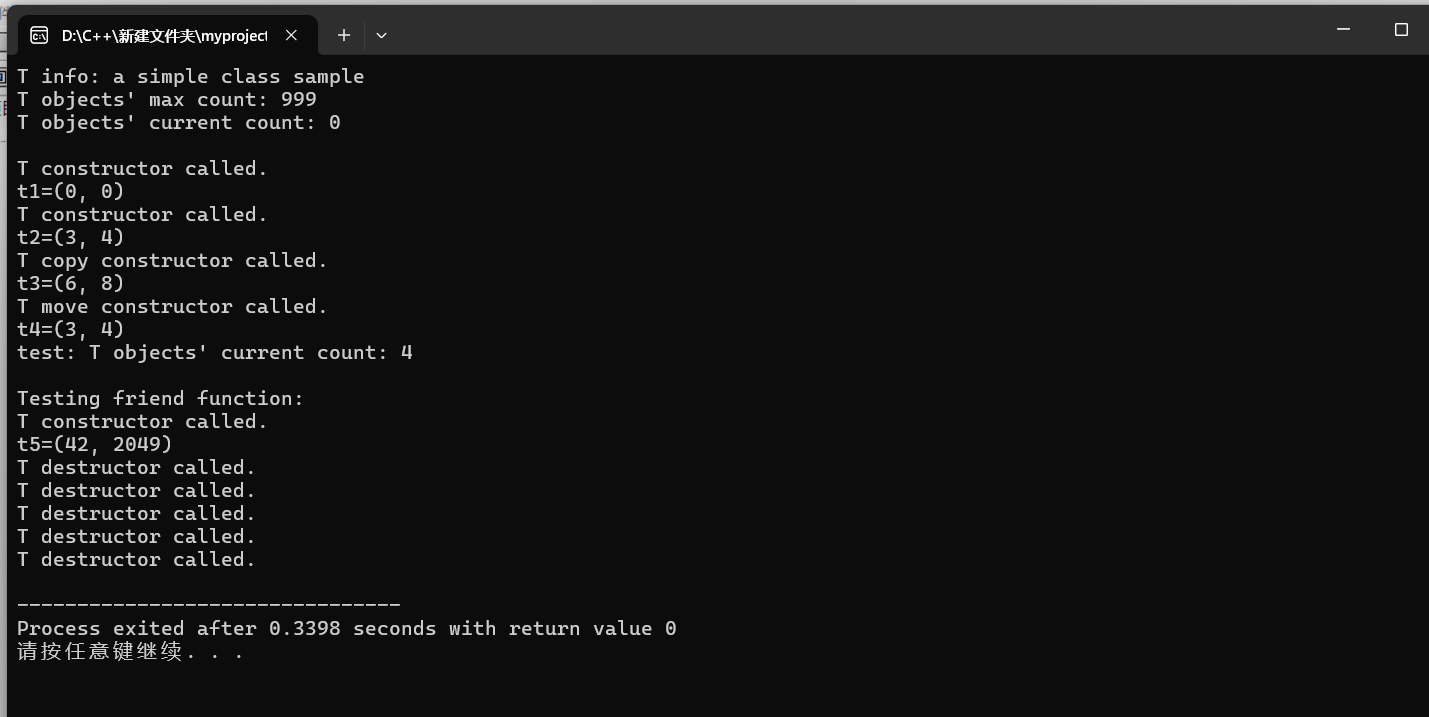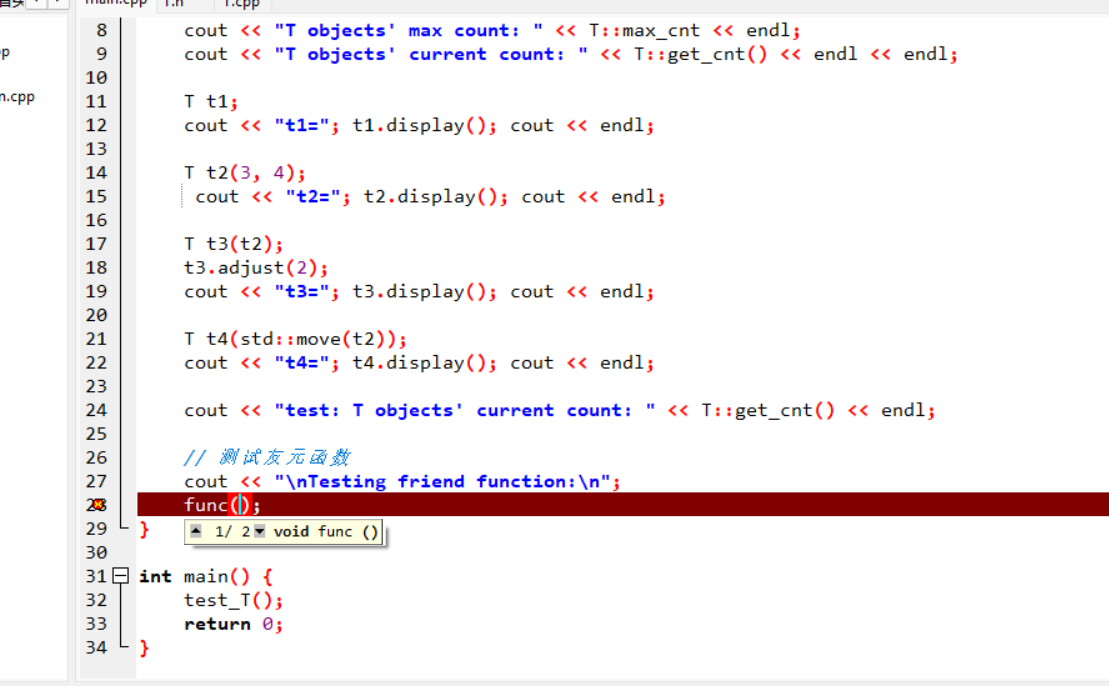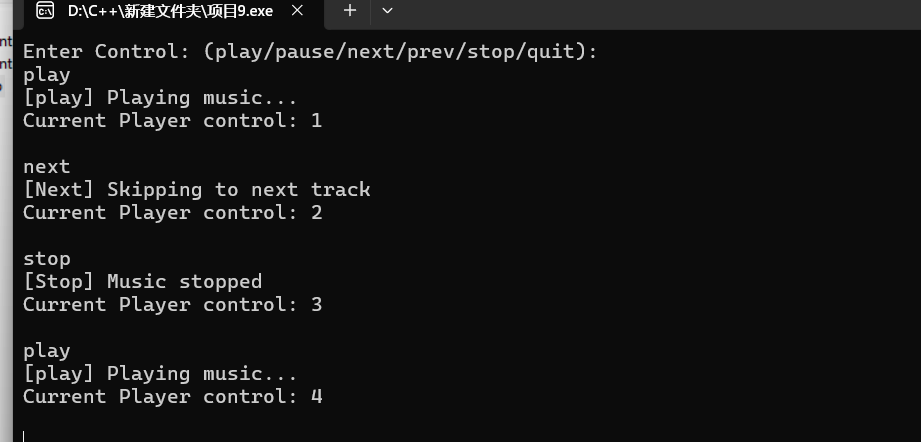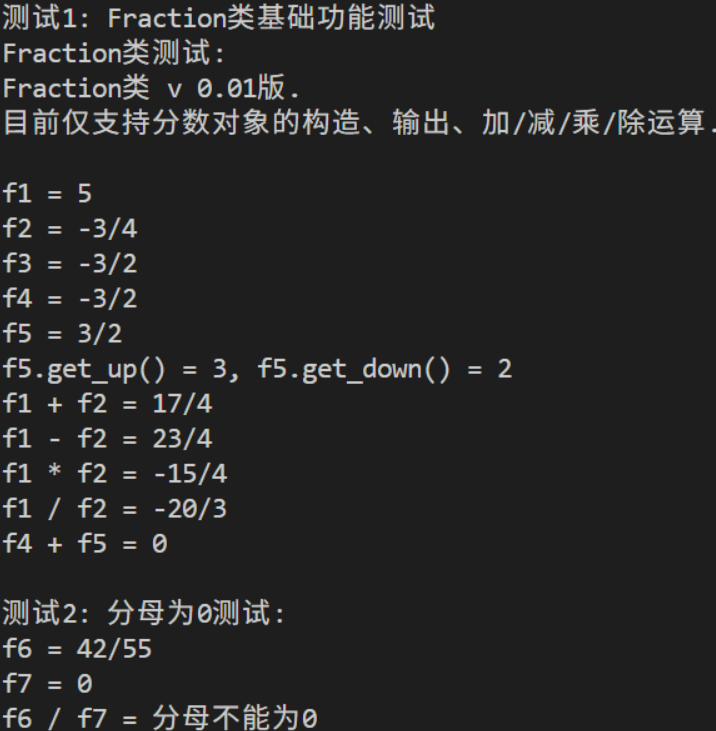实验2
实验任务1:
T.h:
#pragma once #include <string> class T { public: T(int x = 0, int y = 0); T(const T &t); T(T &&t); ~T(); void adjust(int ratio); void display() const; static int get_cnt(); public: static const std::string doc; static const int max_cnt; private: int m1, m2; static int cnt; friend void func(); }; void func();
T.cpp
#include "T.h" #include <iostream> #include <string> using namespace std; const string T::doc("a simple class sample"); const int T::max_cnt = 999; int T::cnt = 0; int T::get_cnt() { return cnt; } T::T(int x, int y) : m1(x), m2(y) { ++cnt; cout << "T constructor called.\n"; } T::T(const T &t) : m1(t.m1), m2(t.m2) { ++cnt; cout << "T copy constructor called.\n"; } T::T(T &&t) : m1(t.m1), m2(t.m2) { ++cnt; cout << "T move constructor called.\n"; } T::~T() { --cnt; cout << "T destructor called.\n"; } void T::adjust(int ratio) { m1 *= ratio; m2 *= ratio; } void T::display() const { cout << "(" << m1 << ", " << m2 << ")"; } void func() { T t5(42); t5.m2 = 2049; cout << "t5="; t5.display(); cout << "\n"; }
task1.cpp
#include "T.h" #include <iostream> using namespace std; void test_T() { cout << "T info: " << T::doc << endl; cout << "T objects' max count: " << T::max_cnt << endl; cout << "T objects' current count: " << T::get_cnt() << endl << endl; T t1; cout << "t1="; t1.display(); cout << endl; T t2(3, 4); cout << "t2="; t2.display(); cout << endl; T t3(t2); t3.adjust(2); cout << "t3="; t3.display(); cout << endl; T t4(std::move(t2)); cout << "t4="; t4.display(); cout << endl; cout << "test: T objects' current count: " << T::get_cnt() << endl; cout << "\nTesting friend function:\n"; func(); } int main() { test_T(); return 0; }
实验结果:

问题1:
不能被编译,
友元函数不被申明,只有定义就无法找到位置,程序自然无法运行
问题2:
T(int x=0,int y=0)用于输出内容.用在申明对象的时候
T(const T &t) 此函数为
构造函数,用于复制基本函数所输出的内容。。用以有对象来初始化新对象
T(T&&t)移动构造函数 移动从右值移动到一个新对象
~T() 用于释放对象占用资源 用在离开作用域的时候
问题3:
yes
实验任务2:
Complex.h:
#pragma once #include <string> class Complex { private: double real; double imag; public: static const std::string doc; Complex(double r = 0.0, double i = 0.0); Complex(const Complex& other); double get_real() const; double get_imag() const; void add(const Complex& other); friend void output(const Complex& c); friend double abs(const Complex& c); friend Complex add(const Complex& c1, const Complex& c2); friend bool is_equal(const Complex& c1, const Complex& c2); friend bool is_not_equal(const Complex& c1, const Complex& c2); }; void output(const Complex& c); double abs(const Complex& c); Complex add(const Complex& c1, const Complex& c2); bool is_equal(const Complex& c1, const Complex& c2); bool is_not_equal(const Complex& c1, const Complex& c2);
Complex.cpp
#include "Complex.h" #include <iostream> #include <cmath> using namespace std; const string Complex::doc = "a simplified Complex class"; Complex::Complex(double r, double i) : real(r), imag(i) {} Complex::Complex(const Complex& other) : real(other.real), imag(other.imag) {} double Complex::get_real() const { return real; } double Complex::get_imag() const { return imag; } void Complex::add(const Complex& other) { real += other.real; imag += other.imag; } void output(const Complex& c) { cout << c.real; if (c.imag >= 0) { cout << " + " << c.imag << "i"; } else { cout << " - " << -c.imag << "i"; } } double abs(const Complex& c) { return sqrt(c.real * c.real + c.imag * c.imag); } Complex add(const Complex& c1, const Complex& c2) { return Complex(c1.real + c2.real, c1.imag + c2.imag); } bool is_equal(const Complex& c1, const Complex& c2) { return (c1.real == c2.real) && (c1.imag == c2.imag); } bool is_not_equal(const Complex& c1, const Complex& c2) { return !is_equal(c1, c2); }
task.cpp
#include <iostream> #include <iomanip> #include <complex> #include "Complex.h" using namespace std; void test_Complex(); void test_std_complex(); int main() { cout << "******测试1:自定义类Complex******" << endl; test_Complex(); cout << "\n******测试2:标准库模板类Complex******" << endl; test_std_complex(); return 0; } void test_Complex() { using std::cout; using std::endl; using std::boolalpha; cout << "类成员测试:" << endl; cout << Complex::doc << endl << endl; cout << "Complex对象测试:" << endl; Complex c1; Complex c2(3, -4); Complex c3(c2); Complex c4 = c2; const Complex c5(3.5); cout << "c1 = "; output(c1); cout << endl; cout << "c2 = "; output(c2); cout << endl; cout << "c3 = "; output(c3); cout << endl; cout << "c4 = "; output(c4); cout << endl; cout << "c5.real = " << c5.get_real() << ", c5.imag = " << c5.get_imag() << endl << endl; cout << "复数运算测试:" << endl; cout << "abs(c2) = " << abs(c2) << endl; c1.add(c2); cout << "c1 += c2, c1 = "; output(c1); cout << endl; cout << boolalpha; cout << "c1 == c2 : " << is_equal(c1, c2) << endl; cout << "c1 != c2 : " << is_not_equal(c1, c2) << endl; c4 = add(c2, c3); cout << "c4 = c2 + c3, c4 = "; output(c4); cout << endl; } void test_std_complex() { using std::cout; using std::endl; using std::boolalpha; cout << "std::complex<double>对象测试:" << endl; std::complex<double> c1; std::complex<double> c2(3, -4); std::complex<double> c3(c2); std::complex<double> c4 = c2; const std::complex<double> c5(3.5); cout << "c1 = " << c1 << endl; cout << "c2 = " << c2 << endl; cout << "c3 = " << c3 << endl; cout << "c4 = " << c4 << endl; cout << "c5.real = " << c5.real() << ", c5.imag = " << c5.imag() << endl << endl; cout << "复数运算测试:" << endl; cout << "abs(c2) = " << abs(c2) << endl; c1 += c2; cout << "c1 += c2, c1 = " << c1 << endl; cout << boolalpha; cout << "c1 == c2 : " << (c1 == c2) << endl; cout << "c1 != c2 : " << (c1 != c2) << endl; c4 = c2 + c3; cout << "c4 = c2 + c3, c4 = " << c4 << endl; }
运行结果:

问题1:
标准库模板complex更简洁;有关,标准库通过运算符重载写出运算代码,给更加直观。
问题2:
2.1:
需要;output需要访问real和imag来进行输出
abs需要访问real和imag来计算模长
add需要进行加法运算
is_equal和is_not_equal也需要比较实部和虚部
2.2:
没有。abs是非成员函数不是友元函数
2.3:
需要访问多个对象的为私有成员,提供特殊功能的非成员函数
问题3:
class Complex { private: double real; double imag; public: Complex(const Complex& other) = delete; };
可以以上述代码
实验任务3:
PlayerControl.h:
#pragma once #include <string> enum class ControlType { Play, Pause, Next, Prev, Stop, Unknown }; class PlayerControl { public: PlayerControl(); ControlType parse(const std::string& control_str); void execute(ControlType cmd) const; static int get_cnt(); private: static int total_cnt; };
PlayerControl.cpp:
#include "PlayerControl.h" #include <iostream> #include <algorithm> #include <cctype> int PlayerControl::total_cnt = 0; PlayerControl::PlayerControl() {} ControlType PlayerControl::parse(const std::string& control_str) { std::string lower_str = control_str; std::transform(lower_str.begin(), lower_str.end(), lower_str.begin(), [](unsigned char c) { return std::tolower(c); }); if (lower_str == "play") { total_cnt++; return ControlType::Play; } else if (lower_str == "pause") { total_cnt++; return ControlType::Pause; } else if (lower_str == "next") { total_cnt++; return ControlType::Next; } else if (lower_str == "prev") { total_cnt++; return ControlType::Prev; } else if (lower_str == "stop") { total_cnt++; return ControlType::Stop; } else { return ControlType::Unknown; } } void PlayerControl::execute(ControlType cmd) const { switch (cmd) { case ControlType::Play: std::cout << "[play] Playing music...\n"; break; case ControlType::Pause: std::cout << "[Pause] Music paused\n"; break; case ControlType::Next: std::cout << "[Next] Skipping to next track\n"; break; case ControlType::Prev: std::cout << "[Prev] Back to previous track\n"; break; case ControlType::Stop: std::cout << "[Stop] Music stopped\n"; break; default: std::cout << "[Error] Unknown control\n"; break; } } int PlayerControl::get_cnt() { return total_cnt; }
task3.cpp:
#include "PlayerControl.h" #include <iostream> void test() { PlayerControl controller; std::string control_str; std::cout << "Enter Control: (play/pause/next/prev/stop/quit):\n"; while (std::cin >> control_str) { if (control_str == "quit") break; ControlType cmd = controller.parse(control_str); controller.execute(cmd); std::cout << "Current Player control: " << PlayerControl::get_cnt() << "\n\n"; } } int main() { test(); return 0; }
实验结果:

实验4:
Fraction.h
#pragma once #include <string> class Fraction { private: int up; int down; void simplify(); int gcd(int a, int b) const; public: static const std::string doc; Fraction(int numerator = 0, int denominator = 1); Fraction(const Fraction& other); int get_up() const; int get_down() const; Fraction negative() const; friend void output(const Fraction& f); friend Fraction add(const Fraction& f1, const Fraction& f2); friend Fraction sub(const Fraction& f1, const Fraction& f2); friend Fraction mul(const Fraction& f1, const Fraction& f2); friend Fraction div(const Fraction& f1, const Fraction& f2); }; void output(const Fraction& f); Fraction add(const Fraction& f1, const Fraction& f2); Fraction sub(const Fraction& f1, const Fraction& f2); Fraction mul(const Fraction& f1, const Fraction& f2); Fraction div(const Fraction& f1, const Fraction& f2);
Fraction.cpp
#include "Fraction.h" #include <iostream> #include <stdexcept> #include <cmath> using namespace std; const string Fraction::doc = "Fraction类 v0.01版。\n目前仅支持分数对象的构造、输出、加/减/乘/除运算。"; int Fraction::gcd(int a, int b) const { a = abs(a); b = abs(b); while (b != 0) { int temp = b; b = a % b; a = temp; } return a; } void Fraction::simplify() { if (down == 0) return; if (down < 0) { up = -up; down = -down; } int common = gcd(up, down); if (common != 0) { up /= common; down /= common; } } Fraction::Fraction(int numerator, int denominator) : up(numerator), down(denominator) { if (down == 0) { throw invalid_argument("分母不能为0"); } simplify(); } Fraction::Fraction(const Fraction& other) : up(other.up), down(other.down) {} int Fraction::get_up() const { return up; } int Fraction::get_down() const { return down; } Fraction Fraction::negative() const { return Fraction(-up, down); } void output(const Fraction& f) { if (f.down == 0) { cout << "分母不能为0"; return; } if (f.down == 1) { cout << f.up; } else { cout << f.up << "/" << f.down; } } Fraction add(const Fraction& f1, const Fraction& f2) { int new_up = f1.up * f2.down + f2.up * f1.down; int new_down = f1.down * f2.down; return Fraction(new_up, new_down); } Fraction sub(const Fraction& f1, const Fraction& f2) { int new_up = f1.up * f2.down - f2.up * f1.down; int new_down = f1.down * f2.down; return Fraction(new_up, new_down); } Fraction mul(const Fraction& f1, const Fraction& f2) { int new_up = f1.up * f2.up; int new_down = f1.down * f2.down; return Fraction(new_up, new_down); } Fraction div(const Fraction& f1, const Fraction& f2) { if (f2.up == 0) { throw invalid_argument("分母不能为0"); } int new_up = f1.up * f2.down; int new_down = f1.down * f2.up; return Fraction(new_up, new_down); }
task4.cpp
#include "Fraction.h" #include <iostream> using namespace std; void test1(); void test2(); int main() { cout << "测试1: Fraction类基础功能测试\n"; test1(); cout << "\n测试2: 分母为0测试:\n"; test2(); return 0; } void test1() { using std::cout; using std::endl; cout << "Fraction类测试:" << endl; cout << Fraction::doc << endl << endl; Fraction f1(5); Fraction f2(3, -4), f3(-18, 12); Fraction f4(f3); cout << "f1 = "; output(f1); cout << endl; cout << "f2 = "; output(f2); cout << endl; cout << "f3 = "; output(f3); cout << endl; cout << "f4 = "; output(f4); cout << endl; const Fraction f5(f4.negative()); cout << "f5 = "; output(f5); cout << endl; cout << "f5.get_up() = " << f5.get_up() << ", f5.get_down() = " << f5.get_down() << endl; cout << "f1 + f2 = "; output(add(f1, f2)); cout << endl; cout << "f1 - f2 = "; output(sub(f1, f2)); cout << endl; cout << "f1 * f2 = "; output(mul(f1, f2)); cout << endl; cout << "f1 / f2 = "; output(div(f1, f2)); cout << endl; cout << "f4 + f5 = "; output(add(f4, f5)); cout << endl; } void test2() { using std::cout; using std::endl; Fraction f6(42, 55), f7(0, 3); cout << "f6 = "; output(f6); cout << endl; cout << "f7 = "; output(f7); cout << endl; try { Fraction result = div(f6, f7); cout << "f6 / f7 = "; output(result); cout << endl; } catch (const invalid_argument& e) { cout << e.what() << endl; } }
实验结果

我选择的是友元函数方案
友元函数方案可以直接访问私有成员避免平凡调用getter函数



 浙公网安备 33010602011771号
浙公网安备 33010602011771号